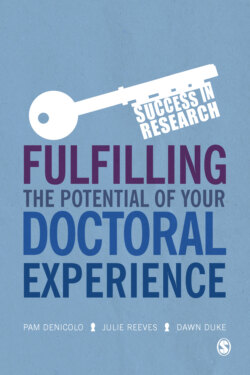Читать книгу Fulfilling the Potential of Your Doctoral Experience - Pam Denicolo - Страница 16
На сайте Литреса книга снята с продажи.
The doctorate in the 21st century
ОглавлениеIn this section, we draw on the UK Quality Assurance Agency’s (QAA) ‘Characteristics Statement – Doctoral Degree’ published in 2015 and to which one of us has contributed. You will find in this document considerable information about the development of the doctorate with comparisons of purpose and structure between doctoral types and between disciplinary or national forms. In summary, though, the main message is that, despite variance in detail, all doctorates are based on original research conducted independently by an individual. We will go into more detail in later chapters about what is meant by the terms ‘original’ (particularly Chapters 4, 7 and 8) and ‘independently’ (particularly Chapters 5 and 6) but, for now, the key criterion is the process of conducting research, with all its skill and knowledge requirements. There is now also a requirement that researchers develop professional skills and attributes, building on those they bring to the task and developing new ones (Chapters 3 and 5 and then 9, 10 and 11 will elaborate on this). This is intended to recognise that all the professions researchers may subsequently engage in, within and outside of the academy, demand high-level skills of various kinds beyond being able to design and conduct a specific research project (see Denicolo and Reeves, 2014). In fact, only a small proportion of successful doctoral candidates will go on to a postdoctoral research post and/or have permanent or tenured academic positions. For more detailed information about (UK) doctoral career destinations, see the ‘What Do Researchers Do’ report on the Vitae website (www.vitae.ac.uk/). Further, any individual may engage in several different ‘careers’ over a lifetime, making skills that are generic and transferable very important. In Information Box 1.1, we present a section from the QAA document about what skills a successful doctoral graduate is expected to be able to contribute to their future work. These are characteristics that we hope to help you achieve by following the advice in this book and those documents and books we recommend.
Information Box 1.1 Characteristics of doctoral graduates (QAA, 2015)
[Doctoral graduates] should all be able to:
search for, discover, access, retrieve, sift, interpret, analyse, evaluate, manage, conserve and communicate an ever-increasing volume of knowledge from a range of sources;
think critically about problems to produce innovative solutions and create new knowledge;
plan, manage and deliver projects, selecting and justifying appropriate methodological processes while recognising, evaluating and minimising the risks involved and impact on the environment;
understand funding and how it can be generated and managed as well as organise infrastructure and identify/locate resources;
engage in professional practice, including ethical, legal, and health and safety aspects, bringing enthusiasm, perseverance and integrity to bear on their work activities;
support, collaborate with and lead colleagues, using a range of communication, teaching and networking skills to influence practice and policy in diverse environments;
appreciate the need to engage in research with impact and to be able to communicate it to diverse audiences including the public;
build relationships with peers, senior colleagues, students and stakeholders with sensitivity to equality, diversity and cultural issues.
Further, doctoral researchers are increasingly being encouraged to develop their foreign language and enterprise skills and to cultivate business acumen.
During their research, all doctoral graduates will have developed additional specialist discipline knowledge while those who have studied a professional doctorate are likely to have been required to have specific professional experience that informs the topic of their research studies. They may well also have been required to engage in further study related to that professional field as part of their doctorate.
Finally, they must be able to prepare, plan and manage their own career development whilst knowing when and where to draw on support.
It is generally recognised that doctoral researchers begin the degree with a wide range of previous experience, personal attributes and acquired skills. Researchers will also have a varying range of opportunities to enhance current skills or learn new ones within their doctoral studies programmes. Thus, when they graduate, each will have a unique collection of attributes and skills developed to varying degrees. Therefore, the list in Box 1.1 is general for you to select which skills and attributes to focus on specifically over the course of your doctoral studies. Note that the first three bullet points emphasise that research still forms the core of a doctorate. At the same time, though, the intent to develop excellent researchers with a wide range of attributes and skills is at least as important as the purpose of simply producing written bodies of work describing the content of and process of the research. That written body of work, a thesis or dissertation depending on country of origin, is still a vital product and is the most readily examined (Chapter 8).
Whatever stage in the process you are currently at, do not be dismayed by the list, for much help is available to support your achieving these numerous skills. We all recognise, though, that undertaking research over several years can be a demanding task, one unlike your previous education, otherwise the title doctor would not be worth such kudos. Let us explore further what we mean by demanding and different to previous education.
